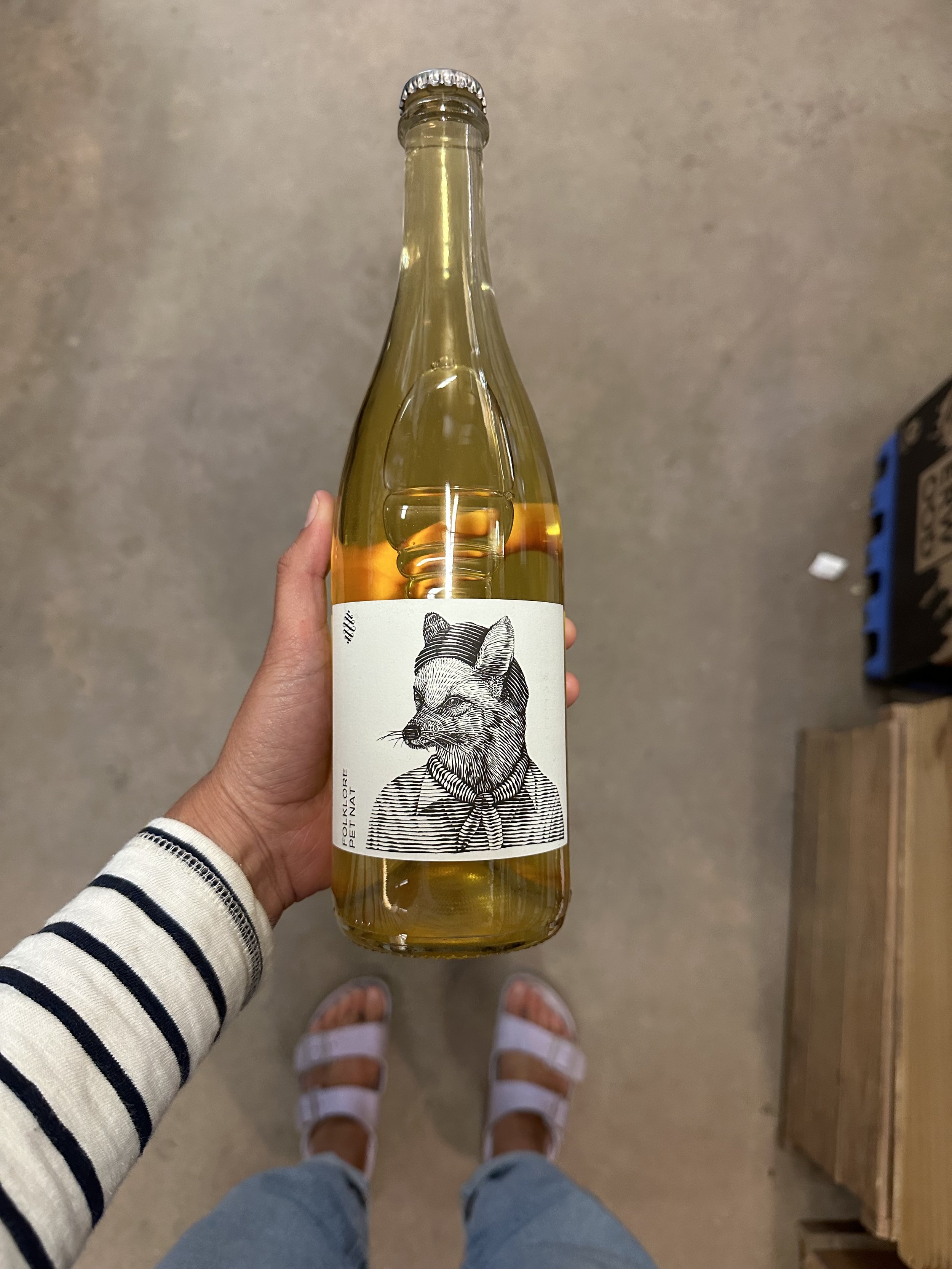The Perfect Brunch Bubbles 001
– the drink that has us raising our glasses (and our pinkies) in celebration of leisurely mornings and the perfect excuse for day-drinking.
FolkLore | PetnatUruguay, Cerro Chapeu80% Trebbiano, 20% Malvasia2021Upon first sip, I couldn’t help but ponder the existential question: Is this what sunshine tastes like? Each bubble seems like a tiny, effervescent morsel of brunch wisdom, as if the grapes themselves were sunbathing in a mimosa-filled Jacuzzi.
The aroma? It’s like a bouquet of freshly picked fruit and the gentle whisper of someone suggesting, “You should definitely have that second helping of eggs benedict.”
With each delightful pop of a bubble, you can practically hear the faint laughter of brunch-goers clinking glasses. Today’s Brunch Bubbles is so enjoyable that you’ll be planning your next brunch rendezvous before you’ve even emptied your glass.
In summary, it’s the wine equivalent of a Sunday Funday – refreshing, crisp, and a gentle reminder that life is better when accompanied by a touch of effervescense. So, here’s to Brunch Bubbles, the official beverage of those who cherish late-morning gatherings and leisurely sipping!
☺ ☻ ☺ ☻ ☺ ☻ ☺ ☻ ☺ ☻
80 percent Trebbiano and 20 percent Malvasia
Altitude: 250 meters above sea level
Soil Profile: Soils of wind origin, red sand, with great depth and water retention capacity
Harvest: Handpicked with 15kg boxes in February 2021
Analysis: Alc. by vol. 13% | TOTAL ACIDITY: 4.3 g/l | pH 3.3 | RESIDUAL SUGAR: 1.5 g/l
The Malvasia and Trebbiano bunches are destemmed and pressed separately. Fermentation begins with native yeast in stainless steel tanks. Before each tank finishes the alcoholic fermentation, the blend is made for bottling. Ancestral method without disgorgement. It presents cloudiness from the yeasts.
Built inside a hill to optimize resources and use gravity for low-input winemaking techniques in Cuchilla de Santana, Uruguay with its sandy, reddish and deep soils, low fertility and very good drainage, it was seen as the perfect place to plant the first virus-free vines.
Quico Carrau Pujol Unveils Groundbreaking Collaboration with UC Davis in Search for Virus-Free Vines' Terroir
Renowned winemaker Quico Carrau Pujol has initiated a groundbreaking collaboration with the prestigious University of California Davis in an ambitious quest to locate the perfect terroir for planting virus-free vines. This bold venture aims to revolutionize the wine industry and pave the way for sustainable viticulture practices.
Carrau Pujol, known for his innovative approach to winemaking, joins forces with UC Davis, a world-leading agricultural research institution, to uncover untapped regions that can foster the growth of vines free from destructive viruses. These debilitating viruses have long plagued vineyards, causing significant damage to vines and impairing the quality and quantity of grapes harvested.
By embarking on this pioneering project, Carrau Pujol and UC Davis aim to identify environments that possess the ideal conditions for cultivating virus-resistant vineyards. Through a combination of extensive research, analysis of soil composition, climatic patterns, and careful sampling, this collaborative effort intends to uncover the paramount factors that contribute to the establishment of virus-free viticulture.
The importance of this endeavor cannot be overstated. As the wine industry continues to face the challenges brought about by climate change and emerging viral threats, the discovery of terroirs capable of safeguarding vineyards becomes all the more crucial. By locating and promoting virus-resistant vineyards, Carrau Pujol and UC Davis hope to ensure a more sustainable future for winemaking while elevating the quality and diversity of wines produced in these selected regions.
Furthermore, this partnership seeks to foster knowledge exchange and implement sustainable practices that benefit both existing and future vineyards. The combined expertise of Carrau Pujol and UC Davis promises to yield innovative approaches to vineyard management, disease prevention, and environmental stewardship. The ultimate goal is to establish a blueprint for winemakers around the world to combat viruses effectively while enhancing the overall sustainability of viticulture.
As anticipation grows, the wine community eagerly awaits the unveiling of the results of this trailblazing collaboration. The discovery of a terroir suitable for planting virus-free vines would not only revolutionize winemaking practices but also inspire future generations to prioritize sustainable and resilient viticulture methods. Quico Carrau Pujol and UC Davis' partnership marks a significant step forward in the quest for a brighter and healthier future.
